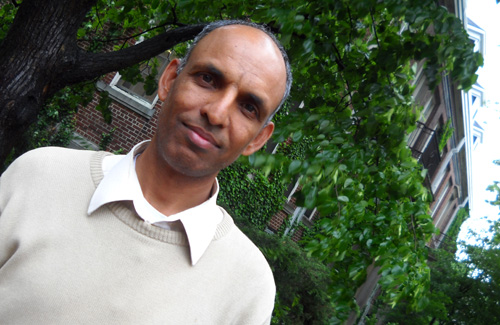
Working night and day is nothing new for many farmers. Ask Sridharan (“Sri”) Sethuratnam, who spent two decades tilling the soil in India. Today in Guelph, he no longer gets his hands dirty full-time. But in another way, farming is still a round-the-clock pursuit for this 52-year-old grad student.
By day, he helps wannabe farmers as a program manager with Guelph-based FarmStart, an organization that supports people eager to try working the land. After hours, he’s monitoring the startup program for his PhD studies in the Department of Geography.
Sethuratnam joined FarmStart in 2008, four years after its establishment. The non-profit organization leases small plots of land and provides help to nurture a new generation of farmers in Canada.
When he arrived, the program numbered eight farmers working anything from a quarter-acre to a few acres. Today, about 30 participants in 21 small-scale operations tend plots on McVean Farm in Brampton, Ont. The organization has begun a second farm this year in Hamilton, and is scouting out new locations and partners in Ontario and even across Canada.
That’s the plan for executive director Christie Young, who was herself a geography grad student working with Prof. John Smithers when she launched FarmStart.
One goal was to nurture new farmers to replace a fast-aging sector. Another was to encourage food production closer to consumers, lessening reliance on an increasingly global food system with its rising transportation, environmental and other costs.
A third goal was to tap into growing markets for ethnocultural foods among recent immigrants to cities such as Toronto.
Hence the Brampton location, says Young. Those fledgling business owners on the McVean farm growing produce for sale around Toronto represent about 16 countries. “They all come from different backgrounds,” she says.
Those farmers also reflect new kinds of ethnic consumers hungry for a taste of home. “New Canadians are not ready to pay downtown Toronto market prices, but they are very interested in food and where it comes from,” says Young. “That’s not the only market that ethnic farmers will serve, but it’s a huge growing market.”
That’s borne out by a U of G study published this spring showing growing demand in the Greater Toronto Area for ethnocultural vegetables from okra to Asian eggplant. Prof. Glen Filson, School of Environmental Design and Rural Development, found that a large market exists for locally grown produce among the roughly 800,000 Canadians of South Asian descent living around Toronto. (That’s the largest cultural group in the GTA, followed by Chinese and Afro-Caribbean Canadians.)
In Brampton, new tenants lease a plot of land to grow their produce, usually beginning with a quarter-acre and working up to a few acres. FarmStart provides shared resources, such as watering and plowing equipment – there’s a farm manager onsite – and advice about growing and business planning. The organization also offers seed funding as well as workshops and farm tours.
The program gives would-be farmers a way to try things out without gambling lives and livelihoods, says Sethuratnam. A new farmer’s plans may not work out, but at least they won’t lose everything.
Adds Young: “We don’t make it easy. Farming is hard. It’s a lot of work and there’s a lot of risk involved. We can make it a little less risky, a little less lonely and a little more accessible.”
Some applicants are looking at changing careers. Others are still working full-time and want to get a taste of life on the land, says Rebecca Hodges. Having completed an organic agriculture degree at U of G last year, she runs farm tours and workshops in organic production as a full-time training and resource intern with FarmStart.
“It’s for people lacking connections and not tapped in to farming,” she says. “That’s the purpose of FarmStart.”
Sethuratnam helps promote the program and assists FarmStart participants with business planning. “We think we should invest in these people, whether they’re a success or not.” He screens applicants to see how serious they are about their venture; this program is not for gardeners or hobbyists, he says.
He studied agricultural engineering in India, where he farmed for about 20 years. Along the way, he worked on soil conservation in Brunei and spent a year with the International Development Research Centre in Singapore, looking at rural-urban migration and traditional knowledge systems.
He completed his master’s degree with Filson, studying environmental best management practices among farmers. He co-authored Filson’s study of ethnocultural produce.
Last fall, Sethuratnam began a PhD on farm startup programs with geography professor Evan Fraser, author of Empires of Food.
Now he’s helping to establish that new FarmStart location in Hamilton. There, two prospective farmers have begun working slices of soil on a 50-acre plot leased from a local restaurant group. Beyond that, the organization is looking into locations around Cambridge and east Toronto, and is discussing partnerships around Ottawa and British Columbia.
As for Sethuratnam, he’s content to tend his own vegetables on a half-acre property in Oakville. “That’s where I get my hands dirty.”